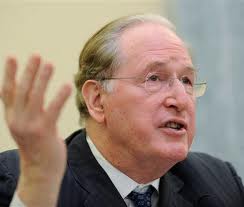Rock-ing the Video World
The smarter way to stay on top of the multichannel video marketplace. Sign up below.
You are now subscribed
Your newsletter sign-up was successful

WASHINGTON — If Sen. Jay Rockefeller (D-W.Va.) has his way — and that’s a big “if” — over-the-top video providers would get access to programming rights similar to those given to satellite operators in the 1992 Cable Act in an effort to make them more competitive with cable MVPDs.
Rockefeller introduced an omnibus video-reform bill that was over the top in more ways than one. Literally, it was a bill to boost the competitiveness of online video providers by giving them a path to multichannel video-programming distributor (MVPD) citizenship. It was also over the top in the sense that it was wide-ranging and hit at least one key hot button that will make the measure hard for Republicans to swallow.
Asked if the bill had any GOP support, a Rockefeller spokesperson would only say the bill “starts a long overdue conversation about these issues.”
The bill’s goal is to ensure that cable operators and their affiliated over-the-top services cannot disadvantage online competitors. Aides to the senator conceded the bill was meant to be a conversation starter, and it was. Cable operators, for their part, suggested that online video providers were already doing quite well.
“Services like Netflix already have almost 30 million U.S. subscribers — far larger than any single multichannel video provider,” the National Cable & Telecommunications Association said in a statement. “In addition, Hulu, iTunes, Amazon Prime, Redbox, Vudu, Vimeo, Boxee, Roku, Apple TV and YouTube are providing consumers with increasing options for competitive entertainment choices, facilitated in large part by massive ongoing investments in broadband networks. In a world marked by such dynamism and robust competition, prudent policy dictates the removal of regulatory obstacles for all instead of creating marketplace disparities that would ‘cherry-pick’ rights and obligations for some.”
Given that those Rockefeller aides also described the measure as essentially imposing 1992 satellite regulations on Internet delivery, the bill is unlikely to draw support from Republicans, who are looking for fewer regulations on everyone and have argued against transplanting old regulatory regimes onto new delivery systems.
The bill, like the a la carte bill from Sen. John McCain (R-Ariz.) before it, is more likely to be a catalyst for debate in the run-up to the Satellite Television Extension and Localism Act (STELA) than something that hits President Obama’s desk, but it provided plenty to talk about.
The smarter way to stay on top of the multichannel video marketplace. Sign up below.
That included not requiring over-the-top providers to pay retransmission-consent fees or subjecting them to local franchising authorities. But the bill was a bit of a grab bag, ranging into copyright issues, usage-based pricing and more.
Following are some of the highlights — or lowlights, depending on one’s perspective — of a bill that would make the following changes to the Communications Act:
• Internet-service providers would have to provide plain-language disclosures in any ads of whatever the Federal Communications Commission decides consumers need to know about the service and must provide a laundry list of disclosures to their subscribers about everything from actual upload and download speeds to a “projected monthly bill.”
• The FCC would have to set up a usage-based billing monitoring regime to ensure ISPs are accurately gauging that use, and ISPs could not use usage-based billing to disadvantage competing OVDs.
• None of the bill’s provisions affect contracts struck before Dec. 1, but they would apply to any contract renewals.
• The bill makes it unlawful for either broadcast networks or stations to refuse to negotiate with OVDs for carriage or to limit which platforms or devices can access the content. The FCC would have to defi ne and apply a “goodfaith” negotiation standard.
• Broadcasters can’t provide OVDs with a materially different signal than what it broadcasts. [Editor’s Note: The McCain a la carte bill has a similar provision.]
• An antenna-rental service [i.e., Aereo] shall be exempt from paying retransmission-consent fees, though it would have to pay a compulsory license for the underlying programming.
• In a nod to net neutrality, the bill would not allow an ISP to “block, degrade or otherwise impair any content provided by an online video distributor.”
• The bill states that any OVD that provides programing “in a manner reasonably equivalent to a multichannel video programming distributor may elect to be treated as a nonfacilities- based multichannel-video programming distributor.” But OVDs that elect that option will not be subject to franchising authorities, syndicated exclusivity or network nonduplication requirements, and can deliver out-ofmarket TV stations if a consumer wants them.
TAKEAWAY
A new omnibus video reform bill in the Senate would give over-the-top video providers a route to full MVPD citizenship.
Contributing editor John Eggerton has been an editor and/or writer on media regulation, legislation and policy for over four decades, including covering the FCC, FTC, Congress, the major media trade associations, and the federal courts. In addition to Multichannel News and Broadcasting + Cable, his work has appeared in Radio World, TV Technology, TV Fax, This Week in Consumer Electronics, Variety and the Encyclopedia Britannica.

